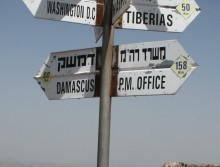 The past week has been an intense one for the Middle East. A bomb assassinated high-ranking Syrian officials as the rebels made their first real strides towards toppling the regime. A bus bombing killed and wounded a number of Israelis in Bulgaria, with Israel accusing Iran of being behind the terror attack.
The past week has been an intense one for the Middle East. A bomb assassinated high-ranking Syrian officials as the rebels made their first real strides towards toppling the regime. A bus bombing killed and wounded a number of Israelis in Bulgaria, with Israel accusing Iran of being behind the terror attack.
And Israel publicly expressed concern about Syria’s chemical weapons. All of these moves stand like yellow road signs: Warning, rough roads ahead.
Syria is coming to a boiling point. The rebels made several major moves this past week. One was the bomb assassination of the defense minister and other officials. Yet another is an outbreak of fighting in the capital of Damascus.
While the West has reason to be concerned about the bloodshed in both those steps, and the potential for vigilante violence to break out, they do send a clear signal to the regime that no one is safe. The government is not invincible.
The rebels are not farmers with machine guns. Tanks and artillery may not be enough to crush them.
The message may have been received by President Bashar al-Assad. He reportedly travelled to a coastal city on the Mediterranean, according to The Christian Science Monitor. The reason, and even the validity of the claims, is unclear. But the implication is Assad could be preparing to flee the country if necessary.
The leader of a country does not leave the capital under normal circumstances. Primarily, it sends a signal of fear and desperation. In most conflicts, once the capital city with all its prestige and defense falls, the country does too. In a civil war like this one, it proves that the general populace has effectively rejected the regime. If Damascus is lost or if Assad acts like it is, it’s a matter of when—not if—the government will collapse.
The need for a peaceful result is essential. As distasteful as it would be for Assad to find asylum, that could save thousands of lives. Unfortunately, Russia may be the only hope there, and their decision to veto another United Nations resolution on Syria sends a bad signal.
Maybe Russia is trying to keep open their connection to Assad to facilitate an asylum-deal. Or maybe they are so concerned that cutting off Assad will worry other nasty allies, such as Iran, that they’re stuck backing a murderer. If so, the West must bring as much diplomatic pressure as possible phentermine purchase uk onto Russia to convince them to change course anyway. Lives are literally at stake.
And maybe beyond just Syria. Israeli Defense Minister Ehud Barak expressed concern multiple times this week about Syrian chemical weapons. The fear is that radicals will acquire them in the chaos, or that the Assad regime will transfer them to their Hezbollah allies in Lebanon.
Either move could put many Israelis in jeopardy and would be a game-changer for Israel. A preemptive strike is a very real possibility, which in the current climate could spark a regional war.
That is already a worry. Israel, to its great credit, has reacted with a calculating and measured response to the vicious bus bombing in Bulgaria. Assuming Hezbollah, and by extension Iran, are indeed behind the attack, Israel has a right to retaliate.
But things are much too tense for an open and fast move. So Israel appears to be waiting. Maybe they’re going to wait for years. Maybe not. Maybe the public will never know how Israel responded.
Regardless, tensions are soaring. Israeli Prime Minister Benjamin Netanyahu has spoken of a list of attempted Iranian terror attacks foiled in the last year across the globe. Considering one was just recently in Cyprus, it raises serious questions on whether Iran will be content with one attack to send a bloody message.
Another strike could be too much for Israel to hold back. No nation can permit terror attacks on its civilians abroad.
In other words, the Middle East is a combustible powder keg right now. A misplaced spark could start a vicious war. The West needs to do everything it can to mitigate and redirect the tensions. Pressuring Russia and China to force Assad and Iran to back down is essential.
Israel can also continue to balance strength and patience. That will hopefully prevent an incident from launching a conflict, but it also might be necessary to threaten a harsh response to further violence in order to discourage it.
The past couple of months have introduced much volatility to the Middle East. Wisdom will be needed to prevent exponentially more in the next few.
The region isn’t heading off a cliff yet. The road signs are still yellow, not red. But yellow shouts caution for a reason. There’s danger ahead. It’s time to effect a change of course while one still can.
(By Joshua Spurlock, www.themideastupdate.com, July 21, 2012)
